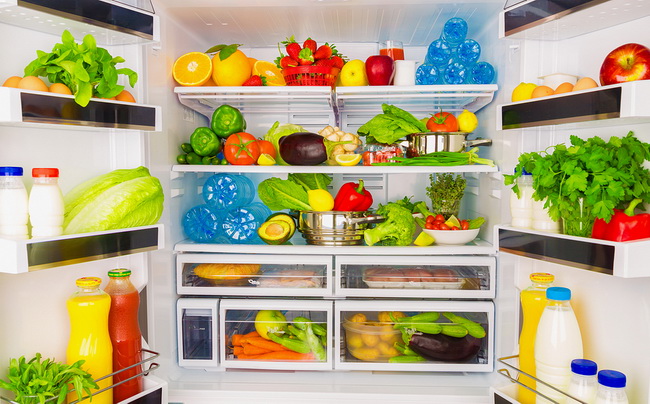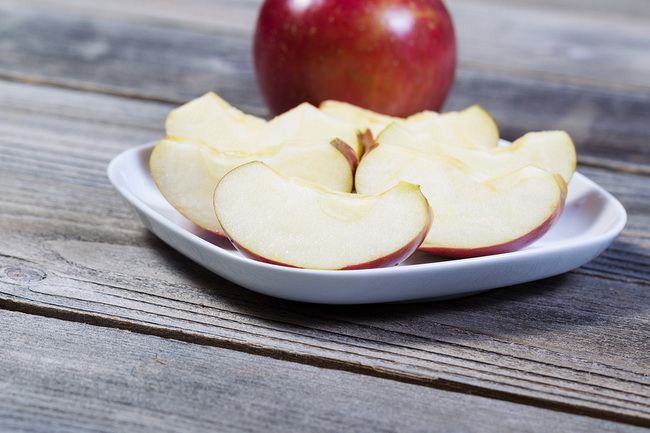- Make It Yourself Lavender Heart-Shaped Bath Bombs!
- 20 Things You Never Knew About “Down There”
- 12 Best Foods For Those Suffering From Arthritis Pain
- 12 Personal Hygiene Mistakes Almost Everyone Makes (Mom Never Told You About #4!)
- 15 Medicinal Plants And Herbs From The Cherokee People
- 12 Mind-Blowing Benefits Of Drinking Coconut Water During Pregnancy
- 12 Outstanding Winter Foods That Won’t Fatten You Up Like A Christmas Turkey
Foods You Probably Have In Your Fridge But Shouldn’t

Photo credit: bigstock.com
Most of us think of our refrigerator as a sort of food sanctuary, a place where we can put food and drink and it will never go bad. Or at least they won’t go bad for a long time. But there are plenty of foods that are actually better off on the counter or in a cupboard than in the fridge.
Although you won’t die if you do keep these foods in the fridge, you will probably end up wasting a lot of money. Some foods go bad more quickly, grow mold, or can actually change the way they taste when kept refridgerated.
Keep reading and find out if you are guilty of having any of these foods in your fridge.
1. Melons
Although melons taste really refreshing when they are cold, they actually are on their best flavor when kept at room temperature. Once you cut them you can feel free to store then in the fridge. This would include watermelons, honeydew, and cantaloupes.
2. Dried Fruits
There is absolutely no need to keep these in the fridge. In fact, unless they are kept in an airtight container, they will only grow mold in the fridge. Store these in plastic bag or some other type of container and keep them in a dry, cool place like a kitchen cabinet or pantry.
3. Peanut Butter
Typical, commercially made peanut butter doesn’t need to be refrigerated. Simply put it in a cool, dark place and it will stay fresh for about 3months. You can refrigerate an opened container if you don’t think you can consume it within 3 months. Peanut butter will keep for about 6 months in the fridge. Homemade peanut butter will be good in the pantry for about 1 month or three months in the fridge. Most people don’t keep their peanut butter around that long, however.
4. Tomatoes
Most people keep tomatoes in the fridge but after about 48 hours, they start to lose their texture and flavor. They are best kept on the counter in a bowl or basket. Be sure to take them out of the plastic bag as they will rot faster. If you need them to ripen faster, place them in a paper bag and leave them on the counter. Your tomatoes will be ripe and ready in just a day or two.
Continue to Page 2

Photo credit: bigstock.com
5. Onions
Onions that are stored in the refrigerator will quickly become soft and moldy because of the humidity. To keep onions at their freshest and for the longest period of time, keep them in a mesh bag in a cool, dark spot. Once cut, you can store them in a sealed container in the fridge but until then, leave them in a net or mesh bag (pantyhose works well) and store them in the pantry.
6. Winter Squash and Pumpkins
Squashes such as butternut, acorn, spaghetti, and even pumpkins, are best kept at room temperature but out of direct sunlight. Let them decorate your kitchen counters until you are ready to use them.
7. Bananas
What you do with you bananas depends on how ripe they are when you buy them. Green bananas should be kept at room temperature so that they can ripen naturally. Putting them in the fridge stops this process. Ripe, yellow bananas should be kept on the counter if you plan on eating them in the next two or three days. If they start to get brown spots, you can put them in the produce drawer of your refrigerator. Although the skin may turn black as can be, the fruit inside should remain perfectly fine and will be ready to eat whenever you are.
8. Citrus Fruits
Lemons, oranges, limes, and grapefruits should all be kept at room temperature or in a cool, dark place for up to 7 days. If you still haven’t consumed them after that, you can store them for another 7 to 10 days in the produce drawer of your refrigerator.
Continue to Page 3

Photo credit: bigstock.com
9. Avocados
If you have unripe avocados, you can leave them on the kitchen counter for a few days until they are fully ripe. After this, if you aren’t ready to consume them, you can store them in the fridge for 7 to 10 days. If you have an unripe avocado that you want to eat pretty quickly, place it in a brown paper bag and leave it on the kitchen counter. It should be ripe and ready to eat in 24 to 36 hours.
10. Bread
Never put bread in the refrigerator! This will dry out the bread and change the texture. If you know you can’t eat it all in a few days, put part of the loaf in a freezer bag or other type of airtight container and put it in the freezer. Read why you should never eat store bought bread.
11. Fresh Herbs
Putting fresh herbs like basil in the fridge will only dry them out make them lose their flavor, and absorb odors from the foods in your refrigerator. Keep them on the counter in a cup of fresh water, similar to the way you keep cut flowers.
12. Coffee
Coffee will only absorb the odors in the fridge and lose its flavor if you keep it in the refrigerator. Store coffee in an airtight container and keep it in a cool, dark place such as a kitchen counter or the pantry.
Continue to Page 4

Photo credit: bigstock.com
13. Honey
Honey has been found in the tombs of the ancient Egyptians, not refrigerated, and even after 3,000 years, it was still good! When you put honey in your fridge it will only cause it to become hard and crystalized. Keep it in a container with a tight fitting lid, out of the sun, preferably in a cool, dark location.
14. Spices
Spices kept in the fridge will only grow moldy with the humidity. Keep them in an airtight container and put them in a kitchen cabinet (but not above the stove where they will get too hot) or on the counter. Keep them out of direct sunlight.
15. Nuts
Most nuts can be stored in a cool, dark place in an airtight container. However, if you buy nuts in bulk, you can lengthen their shelf life by putting them in the refrigerator. Seal them in an airtight container and keep them in the fridge or, better still, in the freezer. Read more about benefits of different nuts.
16. Oil
Cooking oils, such as coconut oil, olive oil, or sunflower oil, shouldn’t be refrigerated, as this will make them thick, cloudy looking, and hard. Leave them in their original containers and put them in a cool, dark place.
Continue to Page 5

Photo credit: bigstock.com
17. Apples
Keeping apples in the fridge will actually change their texture and flavor over time. Keep them on the kitchen counter at room temperature for best flavor.
18. Garlic
Storing garlic in your refrigerator will make it decompose more quickly because it will grow mold. It might also cause it to sprout. Store your garlic in a mesh bag in a cool, dark place.
SEE ALSO: 5 Dangerous Foods That Really Aren’t
19. Condiments
Typical condiments such as mustard, ketchup, and soy sauce do not need to be kept in the fridge as long as you keep the lids on.
20. Potatoes
When potatoes are kept in the fridge, their flavor and texture change dramatically. It’s true that you will get sweeter potatoes, but they will also have a sandy, grainy texture. Keep them in a paper bag or a mesh bag and keep them in a kitchen cabinet. Don’t leave them in those plastic bags as these will trap moisture and cause them to mold.
If you are shaking your head and thinking that there must be more important things going on in the world than this, consider this: Americans alone wastes more than 4 billion tons of food every single year. Food that could have been eaten had it been stored properly. If America was to cut their wasteful food habits by just 5 percent, we could feed more than 4 million more people every single year.
References:

































